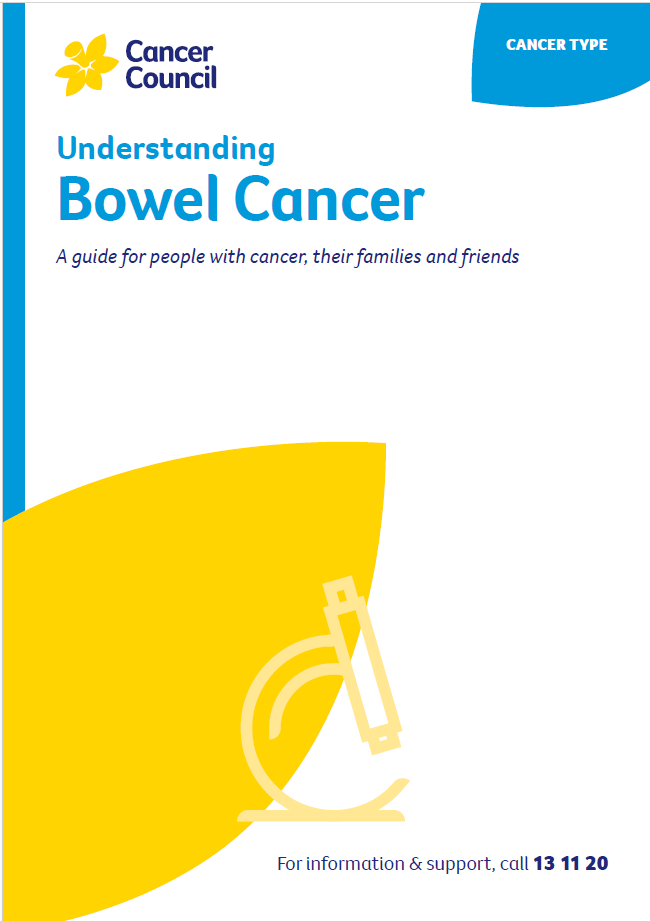- Home
- Bowel cancer
- Diagnosis
- Tests
- Bowel preparation
Bowel preparation before tests
Before some tests, you will have to empty your bowel completely so the doctor can see the bowel clearly. This is called bowel preparation (or washout) and can vary, so ask your doctor what you need to do. It’s important to follow the instructions so you don’t have to repeat the test.
Here are some ways you may be asked by your doctor to prepare your bowels before a test:
 | Change dietFor 5–7 days before, don’t eat any seeds or grains – including fruit and vegetables that contain seeds (e.g. tomatoes and kiwifruit). For breakfast, morning tea and lunch the day before, eat from the white food diet, which includes white rice, white bread, white potato, cheese, eggs, white fish, skinless chicken breast, plain pasta or rice noodles, milk, plain yoghurt and mayonnaise. |
Take prescribed laxativesYou will be prescribed a strong laxative as a powder to mix with water, or as a tablet. You will take the laxative over several hours, starting 12–18 hours before the test. This will cause you to have several episodes of watery diarrhoea and you will need to stay home to be near a toilet. | |
Drink clear fluidsAfter lunchtime the day before your test, you will usually have nothing but clear fluids (e.g. clear apple juice, certain coloured sports drinks and soft drink, broth, water, black tea and coffee). The fluids will help to prevent dehydration. |
Have an enema, if required
One common way to clear the lower part of the bowel is using an enema. You may be given an enema by a nurse at the hospital before a colonoscopy if the laxative hasn’t completely cleaned out the bowel, or if you are only having a flexible sigmoidoscopy. An enema involves putting liquid directly into the rectum. The liquid washes out the lower part of the bowel, along with any faeces.
→ READ MORE: Staging and prognosis for bowel cancer
More resources
Prof Alexander Heriot, Colorectal Surgeon and Director Cancer Surgery, Peter MacCallum Cancer Centre, Director, Lower GI Tumour Stream, Victorian Comprehensive Cancer Centre, VIC; Dr Cameron Bell, Gastroenterologist, Royal North Shore Hospital, NSW; Graham Borgas, Consumer; Prof Michael Bourke, Director of Gastrointestinal Endoscopy, Westmead Hospital, The University of Sydney, NSW; Laura Carman, 13 11 20 Consultant, Cancer Council Victoria, VIC; Amanda Connolly, Specialist Bowel Care Nurse, Icon Cancer Centre Windsor Gardens, SA; A/Prof Melissa Eastgate, Operations Director, Cancer Care Services, Royal Brisbane and Women’s Hospital, QLD; Anne Marie Lyons, Stomal Therapy Nurse, Concord Repatriation General Hospital and NSW Stoma Ltd, NSW; Lisa Nicholson, Manager Bowel Care Services, Bowel Cancer Australia, NSW; Stefanie Simnadis, Clinical Dietitian, St John of God Subiaco Hospital, WA; Rafi Sharif, Consumer; Dr Kirsten van Gysen, Radiation Oncologist, The Nepean Cancer and Wellness Centre, NSW; Sarah Williams, Clinical Nurse Consultant, Lower GI, Peter MacCallum Cancer Centre, VIC.
View the Cancer Council NSW editorial policy.
View all publications or call 13 11 20 for free printed copies.

